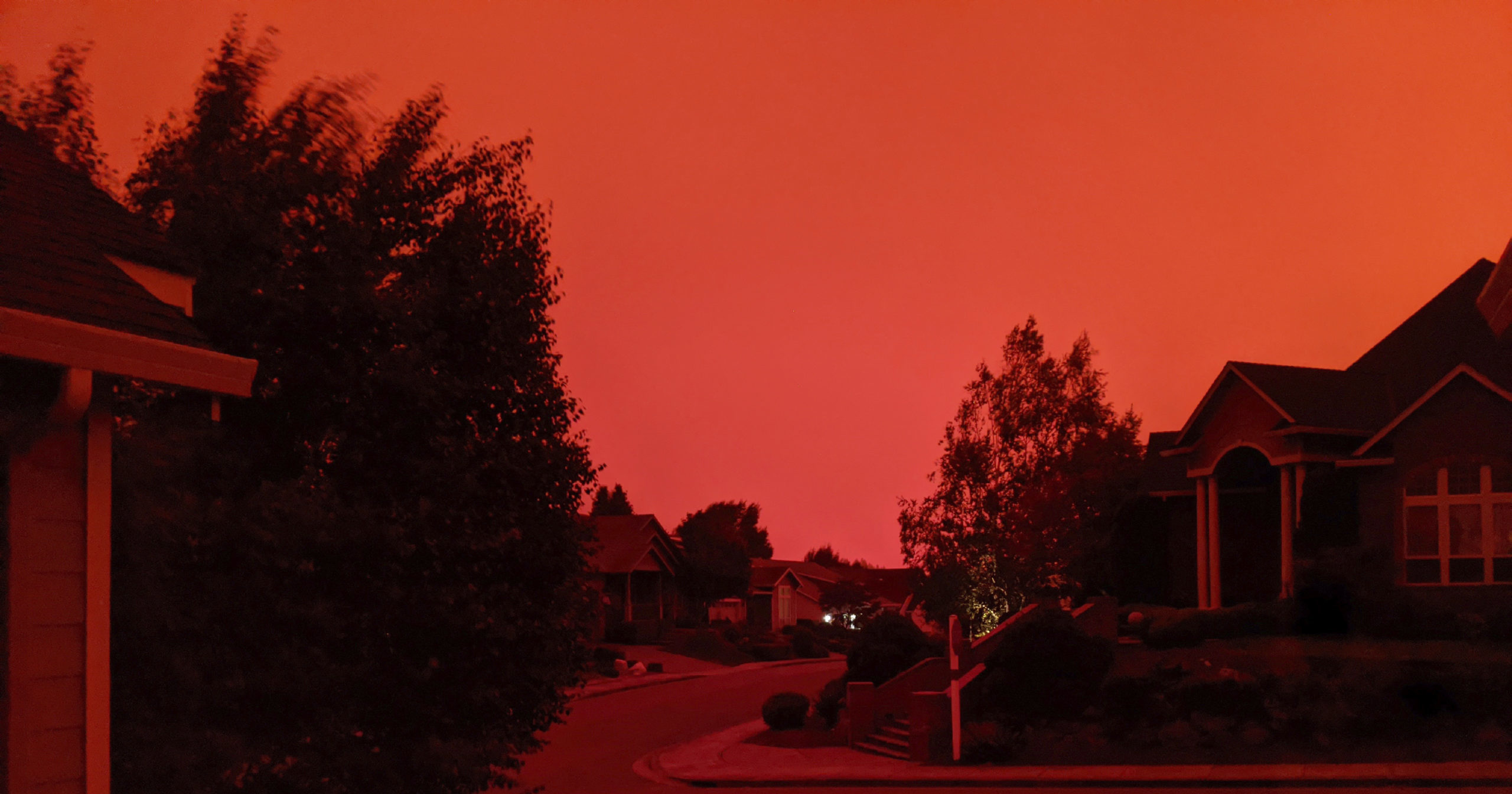
'Catastrophic' Fires Rage Across Pacific Northwest
Windblown wildfires raging across the Pacific Northwest destroyed hundreds of homes in Oregon, the governor said Wednesday, warning: “This could be the greatest loss of human life and property due to wildfire in our state’s history.”
Firefighters struggled to contain and douse the blazes fanned by 50 mph wind gusts, and officials in some western Oregon communities gave residents “go now” orders to evacuate, meaning they had minutes to flee their homes.
The destructive blazes were burning in a large swath of Washington state and Oregon that rarely experiences such intense fire activity because of the Pacific Northwest’s cool and wet climate.
The fires trapped firefighters and civilians behind fire lines in Oregon and leveled an entire small town in eastern Washington.
Oregon Gov. Kate Brown warned that the devastation could be overwhelming from the fires that exploded Monday during a windstorm.
“Everyone must be on high alert,” Brown said. “The next several days are going to be extremely difficult.”
No fatalities from Oregon’s fires had been confirmed by Wednesday afternoon, but Brown said some communities were substantially damaged, with “hundreds of homes lost.”
The precise extent of damage was unclear because so many of the fire zones were too dangerous to survey, according to Oregon Deputy State Fire Marshal Mariana Ruiz-Temple.
“Quite frankly, we are not even able to get into these areas,” she said.
In Washington state, the body of a child was discovered in an area where a giant wildfire had burned but the cause of death was not immediately available, state Commissioner of Public Lands Hilary Franz said.
Pacific Northwest officials said they did not recall so many destructive fires at once in the areas where they were burning.
Sheriff’s deputies, traveling with chain saws in their patrol cars to cut fallen trees blocking roads, went door to door in rural communities 40 miles south of Portland, telling people to evacuate. Since Tuesday, as many as 16,000 people have been told to abandon their homes.
“These winds are so incredible and are spreading so fast, we don’t have a lot of time,” Clackamas County Sheriff Craig Roberts said.
Fires were burning in seven Oregon counties, and rural and suburban homes miles away from Portland, Oregon’s largest city, were under preliminary orders to prepare for possible evacuations. Three prisons were evacuated late Tuesday.
The Pacific Northwest is no stranger to wildfires, but most of the biggest ones until now have been in the eastern or southern parts of the region — where the weather is considerably hotter and drier and the vegetation more fire-prone than it is in the region’s western portion.
Fires in 2017 and 2018 crested the top of the Cascade Mountains — the long spine that divides dry eastern Oregon from the lush western part of the state — but never before spread into the valleys below, according to Doug Grafe, chief of Fire Protection at the Oregon Department of Forestry.
“We do not have a context for this amount of fire on the landscape,” he said.
“Seeing them run down the canyons the way they have — carrying tens of miles in one period of an afternoon and not slowing down in the evening — [there is] absolutely no context for that in this environment.”
Fire crews were focusing on trying to keep people out of harm’s way and preventing houses from burning on Wednesday, with officials saying that containing the fires was a secondary priority.
There was concern that fires south of Portland could merge and become a much larger inferno that would be more difficult for firefighters to handle.
“We’re really at the mercy of the weather right now,” Clackamas Fire District Chief Fred Charlton said.
After a tour of the fire area south of Seattle in Sumner, Washington, Gov. Jay Inslee said the blaze is “just one example of probably the most catastrophic fires we’ve had in the history of the state.”
Inslee said more than 330,000 acres burned during a 24-hour period — an area larger than the acreage that normally burns during entire fire seasons that last from spring into the fall.
About 80 percent of the small eastern Washington farming town of Malden was leveled by flames from a fast-moving fire on Monday. Among the buildings that burned were the town’s fire station, post office, City Hall and library.
“It’s an unprecedented and heart-breaking event,” Inslee told reporters.
He blamed hot weather, high winds and low humidity for the explosive growth of the fires.
In Oregon, at least four major fires were burning in Clackamas County, a suburban county in Oregon that’s a bedroom community of Portland. The entire county of nearly 420,000 people was put on notice to be ready to evacuate late Tuesday amid winds gusting up to 30 mph.
Another major fire in southern Oregon prompted evacuation orders in much of Medford, a city of about 80,000 residents.
And several huge blazes burning in Marion County, southeast of the state’s capitol city of Salem, merged overnight — turning the sky blood red in the middle of the day. Thousands of people were braced to flee if evacuation orders emerged.
Wind storms downed power lines and tens of thousands of people lost power in the northwestern Oregon and southwestern Washington.
The Western Journal has reviewed this Associated Press story and may have altered it prior to publication to ensure that it meets our editorial standards.
Truth and Accuracy
We are committed to truth and accuracy in all of our journalism. Read our editorial standards.
Advertise with The Western Journal and reach millions of highly engaged readers, while supporting our work. Advertise Today.











